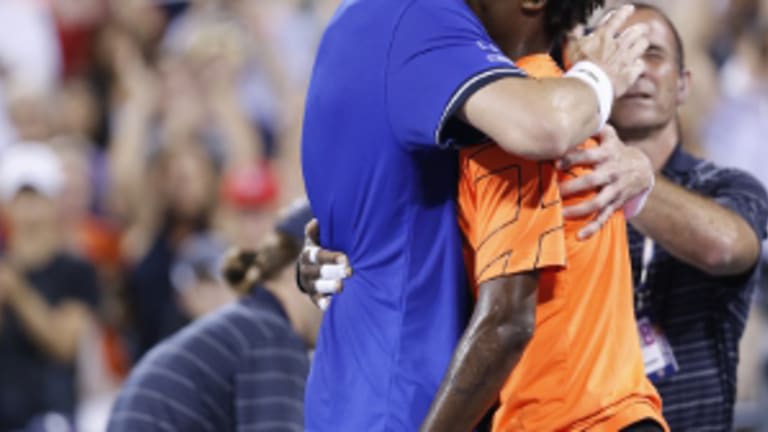NEW YORK—“I had a lot of crowd support,” John Isner said with a wry smile last night after beating Gael Monfils at the U.S. Open. “I had a college buddy of mine I noticed in the crowd, and in the opening point he was hammered.”
Playing a Frenchman at Flushing Meadows, Isner probably expected a little more love than one drunken friend. Isner is the No. 1 American at the moment, and this is the only Grand Slam held in his home country. Yet there he was, at the Open, with the booming chants of “Monfils! Monfils!” ringing in his ears. “It was a little disappointing,” Isner said afterward, “I’m not going to sugarcoat it.” Frankly, it must have come as a shock to him, considering that he had been cheered all summer in places like Atlanta, Washington, D.C., and Cincinnati.
But that’s the thing, or at least the first thing, to remember about what happened in Louis Armstrong Stadium last night: New York is part of the United States, but it’s not exactly like the rest of the country. Its population is more diverse, and it draws far more tourists from overseas. That’s doubly true at the U.S. Open. To take another, less-controversial example from Thursday: A few hours before Isner and Monfils walked on court, England’s Dan Evans talked about how surprised he was that there so many British people in the stands supporting him on Court 17. Even players from Luxembourg have their face-painted cheering sections here.
U.S. players are embraced in New York, of course, but so is charisma and drama and guts, no matter where it comes from—Jimmy Connors wasn’t the King of the Big Apple just because he grew up in Missouri; New Yorkers loved him because he brought a little Broadway, and a lot of grit, to the court. Last night the fans in Armstrong got plenty of showmanship from Monfils. What they were begging for was the drama. The chants of his name grew louder after he fell behind and began to mount a comeback. This match had promised to be an epic—I had written that they should have just started with the fifth-set tiebreaker—and that’s what the audience was determined to have.
What the fans were rooting for more than anything else was the Night Session. This is the great myth of the Open, to be able to say that you were there, in the wee hours, for Agassi-Baghdatis, or a Todd Martin comeback, or a magical surprise like Vicky Duval's upset of Sam Stosur. The fans on Thursday night wanted a taste of that magic, too, and after the first two sets, the only way to get it was to cheer on Monfils. As Isner himself said, “I know the New York fans, they like to see long matches and five setters.”
Of course, when Americans like Agassi and Martin and Duval and Andy Roddick won their epics, the crowd wasn’t bellowing for their foreign opponents. Isner has a right to be disappointed. He has probably dreamed of playing his own mythic night session match a million times; now he gets to be in one, and the crowd is chanting the French guy’s name! But Isner isn’t alone in his disappointment. Before he became Broadway Jimbo, Connors was run off the court after the 1977 Open final at Forest Hills by a mob of fans who picked up his Argentine opponent, Guillermo Vilas, and carried him around in triumph. When John McEnroe beat Bjorn Borg in the finals in 1980 and ’81, the audience in Armstrong shuffled out with a surly grumble. Venus Williams said it took her 15 years to feel at home at the Open. Even Roddick and Agassi didn’t get all the love in the building when they played finals against Roger Federer.
